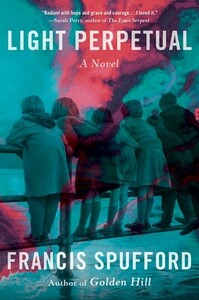You need to sign in or sign up before continuing.
Take a photo of a barcode or cover
challenging
emotional
reflective
sad
tense
medium-paced
Plot or Character Driven:
Plot
Strong character development:
Yes
Loveable characters:
Complicated
Diverse cast of characters:
No
Flaws of characters a main focus:
Yes
adventurous
emotional
reflective
medium-paced
Loveable characters:
No
some of this book was boring and overall i was a bit disappointed, however i think i need to reread it in a few month and properly digest it and then my feelings might change!!
reflective
slow-paced
Plot or Character Driven:
Character
Strong character development:
Yes
Loveable characters:
No
Diverse cast of characters:
No
Flaws of characters a main focus:
Yes
I thought I would enjoy this. I was intrigued by the premise: an exploration of the lives not lived by five children caught in a bombing in the Second World War, a what-if and reflection on the “preciousness of life”. I was disappointed. I think I was expecting it to be a bit more focused on contrast and consequence; instead, it is a collection of vaguely related vignettes following five people who have very different lives. There were some beautiful chapters, and others that were almost painful to get through (I put this down for several days and wasn’t sure I’d continue). I guess I was looking for more plot.
Francis Spufford’s Light Perpetual (Scribner 2021) just oozes traditional Booker Prize type, so I’m not surprised it was longlisted.
The novel opens in 1944 at the Woolworths in South London. The store is packed full of patrons because there are new cookpots available, something that war-torn England hasn’t seen in a long time. A rocket rips through the store. When the dust settles, 168 are dead. The rocket decimating this Woolworths and the cookpots the crowd had come to see are firmly rooted in history, but the five young children who are killed in the opening of Spufford’s novel are fictional – as is the rest of the story.
Spufford takes these five young children and reimagines a world where they didn’t die.
“Come, other future. Come, mercy not manifest in time; come knowledge not obtainable in time. Come, other chances. Come, unsounded deep. Come, undivided light. Come dust.”
The reader gets flashes of their lives, beginning in 1949 and running a lifetime until 2009. The windows open on their worlds, and flashes of color and the pain of living pour out. This isn’t a “happily ever after” story; it’s far too real for that. It bleeds. It cries. It cuts. But it also dreams and laughs.
It lives.
There are the twins, Jo and Val, whose lives take very different directions when they fall for the wrong men. There’s Vern who just can’t shake the childhood nickname of vermin, and for good reason. There’s Alec, the steady and reliable husband and father who devotes his life to print journalism and watches its demise. And there’s Ben, whose demons live inside his head.
Through the years, the reader watches them live. Marriage. Divorce. Murder. Drugs. Mental institutes. Jail. Music. Babies. Memories. Love. The impact of their lives, snuffed out in 1944 and recast for a lifetime, shines in the mundane.
Have you ever seen light reflecting off dust? It’s quite lovely.
“Come, dust.”
Read this boo
The novel opens in 1944 at the Woolworths in South London. The store is packed full of patrons because there are new cookpots available, something that war-torn England hasn’t seen in a long time. A rocket rips through the store. When the dust settles, 168 are dead. The rocket decimating this Woolworths and the cookpots the crowd had come to see are firmly rooted in history, but the five young children who are killed in the opening of Spufford’s novel are fictional – as is the rest of the story.
Spufford takes these five young children and reimagines a world where they didn’t die.
“Come, other future. Come, mercy not manifest in time; come knowledge not obtainable in time. Come, other chances. Come, unsounded deep. Come, undivided light. Come dust.”
The reader gets flashes of their lives, beginning in 1949 and running a lifetime until 2009. The windows open on their worlds, and flashes of color and the pain of living pour out. This isn’t a “happily ever after” story; it’s far too real for that. It bleeds. It cries. It cuts. But it also dreams and laughs.
It lives.
There are the twins, Jo and Val, whose lives take very different directions when they fall for the wrong men. There’s Vern who just can’t shake the childhood nickname of vermin, and for good reason. There’s Alec, the steady and reliable husband and father who devotes his life to print journalism and watches its demise. And there’s Ben, whose demons live inside his head.
Through the years, the reader watches them live. Marriage. Divorce. Murder. Drugs. Mental institutes. Jail. Music. Babies. Memories. Love. The impact of their lives, snuffed out in 1944 and recast for a lifetime, shines in the mundane.
Have you ever seen light reflecting off dust? It’s quite lovely.
“Come, dust.”
Read this boo
hopeful
inspiring
sad
fast-paced
I really liked Golden Hill, I remember bits as brilliant and such a pleasure to read, the way the prose could move from playful meta to capturing just the softness of snow falling. So I was looking forward to this and it’s good, very good in parts, but maybe lacking greatness? Strip away the high concept opening (which seems kinda extra in more than one sense, unnecessary and irritating ) and this is a tender, generous literary take on Our Friends in the North of maybe the Seven Up documentaries, with a clearly Christian ethos that pokes up more than I expected. Good Christian, I think, tentative about judgement and ready to extend compassion to everyone, not afraid of hard edged reality but never quite able to respond with any hardness (or bite) of its own. It made me think of Julian Barnes or maybe Jonathan Coe, that type of English novel that’s a mix of high concept and kinda highbrow soap opera. What I did like a lot tho was the London stuff. I’m being harder on it than I expected to be!
emotional
hopeful
reflective
fast-paced
More of a 3.75
This is an interesting concept and very beautifully written. It wasn't really my sort of book (too literary) but others would probably love it. Thanks to the author and The Pigeonhole for the opportunity to read it.
This is an interesting concept and very beautifully written. It wasn't really my sort of book (too literary) but others would probably love it. Thanks to the author and The Pigeonhole for the opportunity to read it.
Spufford's latest left me a bit puzzled.
After setting up a dramatic prologue in which five children die during the Blitz bombing, he then goes on to tell these children's lives in episodes right up to the present. Sadly, it wasn't at all obvious to me, what the purpose of the prologue was. If he just meant to chronicle the nation's recent history through the biographies of a group of diverse people, why did they need to "die" in the Blitz first?
The various biographies were grippingly written and very entertaining. However, only getting glimpses of their lives and jumping forward decades in between means that my understanding of the various chracters tends to be a bit sketchy.
I enjoyed reading it, but ultimately I fail to see the point of some of the narrative decisions.
After setting up a dramatic prologue in which five children die during the Blitz bombing, he then goes on to tell these children's lives in episodes right up to the present. Sadly, it wasn't at all obvious to me, what the purpose of the prologue was. If he just meant to chronicle the nation's recent history through the biographies of a group of diverse people, why did they need to "die" in the Blitz first?
The various biographies were grippingly written and very entertaining. However, only getting glimpses of their lives and jumping forward decades in between means that my understanding of the various chracters tends to be a bit sketchy.
I enjoyed reading it, but ultimately I fail to see the point of some of the narrative decisions.
hopeful
reflective
sad
fast-paced
Plot or Character Driven:
A mix
Strong character development:
Yes
Loveable characters:
Yes
Diverse cast of characters:
No
Flaws of characters a main focus:
Yes
emotional
hopeful
reflective
slow-paced
Plot or Character Driven:
Character
Strong character development:
No
Loveable characters:
Yes
Diverse cast of characters:
No
Flaws of characters a main focus:
Yes
Graphic: Murder
Minor: Child abuse, Sexual violence





